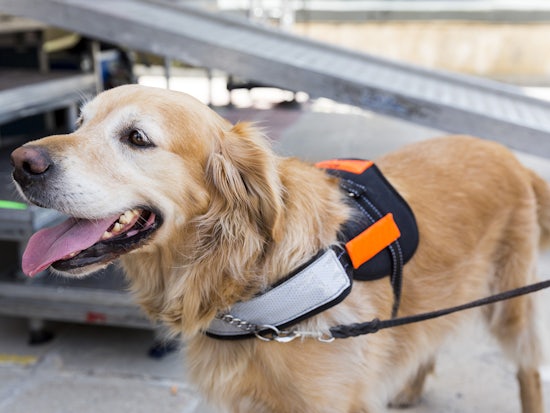Assistance dogs for hearing impaired seniors at risk
Hearing dogs have improved the quality of life for seniors who are deaf or hard of hearing, minimising the impediments that often accompany those living with hearing impairments. However, planned cuts to the National Disability Insurance Scheme (NDIS) may result in limited access for those who require a hearing dog.

Receiving a hearing dog changes a client’s quality of life (Source: Shutterstock)
As of current, 1 in 6 Australians are affected by hearing loss, with approximately 30,000 people with complete hearing loss.
“Hearing loss is an invisible disability. People aren’t aware of sounds that we often take for granted,” says Chief Executive Officer of Lions Hearing Dogs David Horne.
The dogs are specially trained to assist the deaf by alerting and directing their carer to a number sounds that the carer may be unable to hear. These can range from common household noises to, in more extreme cases, fire alarms.
The dogs also provide emotional benefits – hearing dogs can give carers feelings of independence, comfort and security. The responsibility that is required to care for the dog is also accompanied with an additional sense of companionship.
“People who suffer from hearing loss suffer and are isolated. Hearing dogs can encourage community participation and help clients regain socialisation and improve independence.”
As a former trainer, Mr Horne has also witnessed first hand the effects hearing dogs have made on clients. He states that prior to receiving the dogs, clients were often “scared and could not face the outside world”.
But after receiving a hearing dog, the changes to a client’s quality of life were immeasurable.
“We had a client in Victoria who, before receiving her dog, was dependent on her kids and husband. But after receiving her dog she developed the confidence to enrol in university, finished her degree and now travels across Victoria as a social worker.
“She was just a completely different person, and even looked different too.”
The cost for hearing dogs is covered under the NDIS, along with a range of other services to help those living with disabilities.
However, recent changes to the NDIS scheme means that clients over the age of 65 will no longer be covered under the NDIS scheme. This will particularly affect those who rely on the scheme to afford various services.
Mr Horne has expressed concern for what the cut in funding will mean. He states that the organisation itself will also no longer be covered, losing all government funding as of 30th June next year.
This intended change will exclude a significant portion of their clients, who are above the age of 65 and following the proposed changes, will no longer be eligible for the grant.
“Since our funding will be restricted we may not have enough dogs to provide in a timely manner. This will result in an extended waiting list and cause feelings of frustration among clients.
“We’re here to help people – this is what we’ve been doing for the past 35 years. To have these restrictions imposed makes us concerned for the future.”
Currently Lions Hearing Dogs is a non-for-profit organisation who have supplied 550 dogs across Australia since 1982. They rely on funding from the Lions Club, along with sponsorship and donations. As a registered NDIS provider, and Lions Hearing Dogs provide their service at no cost to their clients.
To find out more, visit: https://hearingdogs.asn.au/











![The new Aged Care Act exposure draft is slated for release in December of 2023, but advocates hope to see it rolled out on January 1, 2024. [Source: Shutterstock]](https://agedcareguide-assets.imgix.net/news/articles/wp/agedcareact__0811.jpg?fm=pjpg&w=520&format=auto&q=65)












Comments